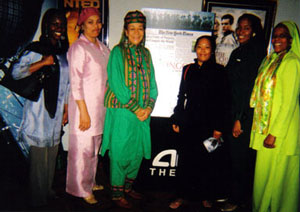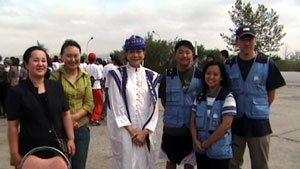“Mongol” —Movie Review
More colmuns by Mother Tynnetta Muhammad
 “O community of jinn and men, did there not come to you messengers from among you, relating to you My messages and warning you of the meeting of this day of yours? They will say: We bear witness against ourselves. And this world’s life deceived them, and they will bear witness against themselves that they were disbelievers. This is because thy Lord would not destroy towns unjustly while their people are negligent.” –Holy Qur’an, Surah 6, verses 131-132
“O community of jinn and men, did there not come to you messengers from among you, relating to you My messages and warning you of the meeting of this day of yours? They will say: We bear witness against ourselves. And this world’s life deceived them, and they will bear witness against themselves that they were disbelievers. This is because thy Lord would not destroy towns unjustly while their people are negligent.” –Holy Qur’an, Surah 6, verses 131-132

We continue now with a few more commentaries gathered from several persons who viewed the film “Mongol.” The film is a foreign production from a Russian producer and was featured this summer opening only in a few theatres across the country. It is fascinating that the people and nation of modern Mongolia are fast arising to a place of imminence within a prophetic timeline. The government and people of Mongolia celebrate their independence from Russian Communist rule at the annual Naadam Festival since winning their independence in 1992. This is celebrated from July 11th-15th. Mongolia experienced her transition to Democratic Rule in the 1990’s and established her first working constitution in 1992.
The history of Mongolia is traced back to more than 40,000 years to its origin in the Steppes of Central Asia beginning with the Ancient Hunnu Empire. This civilization broke up into principalities and small kingdoms who ultimately succumbed in a later period to the present of the Altai Turks. The Turks dominated the area for nearly five centuries before finally migrating to what is now modern-day Turkey. The Mongols are frequently referred to by writers and historians as “Tatars,” and in fact, during the Honorable Minister Louis Farrakhan’s World Friendship Tour III on a visit to Russia’s Great Mosque in Moscow, our driver referred to the great gathering of Muslims during the Id ceremony following Ramadan as “Tatar Muslims.”
An unusual and foreboding destiny is developing between the Nation of Islam in the West and the modern-day country of Mongolia which was never before perceived. As we continue our investigative studies on the history of this remote country and the illustrious leader and founder of modern Mongolia, Ghengis Khan, we continue with several more commentaries and observations made by a small handful of Believers who viewed the film.

“Mongol” is a story about love, loyalty, and war to achieve a unified people. The first Chinese Dynasty under its first emperor Qin started the movement of military strategy in 2000 B.C., which had to be maintained throughout the centuries.” –Sister Carlotta, Los Angeles, California
“The Mongol Nation earned and established the reputation as one of the greatest military Barbarians the world had ever known. Ghengis Khan or Temujin achieved his victories through brilliant organization and tactics. At ten years old he had to take over leadership for his father and was sent into exile, never expecting to live through the harsh winter. He became a slave and managed to escape despite carrying a heavy wooden yoke around his neck.
“By the time he was a teen, he had gained a reputation as a furious warrior. He had this silent allegiance amongst the clans which reminds me of the present day Minister Farrakhan who has established diplomacy amongst other so-called Negroes. For the Khan, he established law after tribes opposed him and were declared enemy. He tried to increase efforts to unite neighboring families and his success was based on the fact that he established unity amongst federated sub-tribes. These were soldiers like the FOI, ready to defend their territory or assume the offense. These practices were similar to Attila the Hun 700 years earlier to Khan.
“The Khan employed an extensive network of spies and scouts who reported enemy strengths and locations … when he saw a weakness he attacked that weakness. His Army never remained static. It evolved as the situation mandated.
“I later learned that the Khan breached the Great Wall and conquered China by 1215 and added the peninsula of Korea in 1218. He then defeated the Turks, then India and Pakistan. In 1222 he invaded Russia and occupied lands from the Persian Gulf to the Arctic Ocean. It was not complacency that slowed him down, it was age. His Empire lasted 150 years.” –Gregory Muhammad, Los Angeles, California
“Mongol” was one of the most realistic and significant movies I have seen in ages. It signifies our history as original people and the legendary Ghengis Khan, who for years Mother Tynnetta has been teaching as having relevance to our roots. The movie displayed only a portion of how powerful Ghengis Khan is, and even in that, it was enough to remind us of what the Most Honorable Elijah Muhammad has taught about the Original Man as being God and owner of the planet earth.” –Sister Queen Muhammad Ali, Phoenix, Arizona
“Mongol” was a brief cinematographic history of Ghengis Khan’s history. I was proud to know the history in advance from reading the research of Mother Tynnetta Muhammad who I believe is spiritually connected to Mongolia. In 2005, Mother published Spring/Fall edition of Cultural Links Magazine titled: ‘Descent of the Mongolian Kings’ and the photos she took during her trip to Mongolia display Asiatic features such as our traditional, native Indigenous families here in North America and as seen in African Egyptian artifiacts. She has validated our teaching of the Asiatic migration from Asia to North and South America. The similiarities of our Nation’s rise parallels the early history of Mongolia. Ghengis’ uniting the tribes with law and God is reminiscent to the struggle the Honorable Elijah Muhammad and the Honorable Minister Louis Farrakhan and many of the Believers experienced. Muhammad gives Mongol two thumbs up!” –Hakeem Khaaliq Muhammad, Phoenix, Arizona
“And for all are degrees according to their doings. And thy Lord is not heedless of what they do. And thy Lord is the Self-sufficient One, the Lord of mercy. If He please, He may remove you, and make whom He pleases successors after you, even as He raised you up from the seed of other people. Surely that which you are promised will come to pass, and you cannot escape (it).” –Holy Qur’an, Surah 6, verses 133-135
To be continued.












